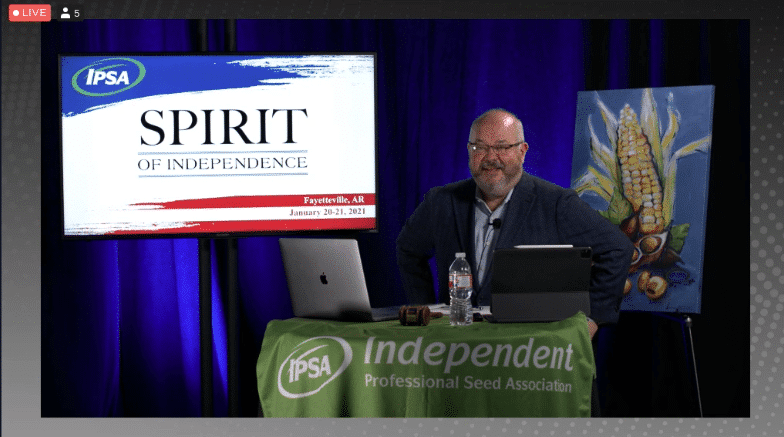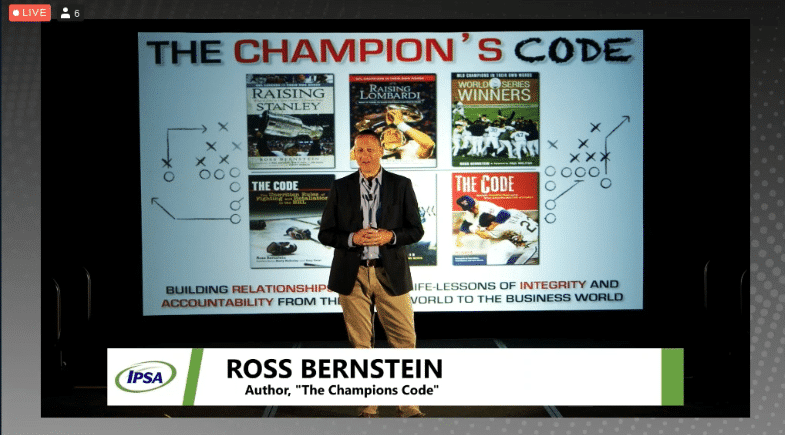IPSA launches day one of their virtual Annual Conference with a bang.
Two weeks ago, on Jan. 7, Todd Martin, CEO of the Independent Professional Seed Association (IPSA), and the IPSA Board of Directors announced that unfortunately — due to COVID-19 — the annual conference in Tucson, Ari., was postponed in favor of a virtual conference.
But no one expected a taste of Tucson to come to the virtual conference.
IPSA’s Annual Conference kicked off with a bang and a tribute to the Day of the Dead — a huge celebration in Tucson that’s right behind Mexico City’s Day of the Dead celebration.
“Had we been in Tucson, we would have celebrated the Day of the Dead last night, and it was going to be an epic party,” Martin said. “Unfortunately, as hard as we tried, we just could not bring everyone together for an in-person conference with everything going on in the country with COVID-19.

“As we open with a review of what we could have done last night and talk about the Day of the Dead, we recognize those people who have succumb to COVID-19 and we do that in remembrance of them,” Martin concluded.
Brett Hodnefield, outgoing president of IPSA, introduced the meeting virtually from Iowa.
“When Todd introduced me as the incoming IPSA president, I stated that I was going to do things my way,” Hodnefield said. “Boy, I could not have been any more wrong. Canceling Tucson and having the conference virtually was not what we wanted, but we’ve had to adapt and move on.
“The ups and downs of this past year will only make us stronger,” Hodnefield said. “Our independent seed business increased markets share again by almost 2%. New options in both traits and genetic accessibility are available for all of us. Competition is good for both seedsman and genetic and trade providers. Let’s put our opinions on social unrest, politics and the pandemic aside and come together as an industry to make 2021 the best year yet for independent seed companies.”
The Champion’s Code
The opening keynote speaker of the IPSA conference was Ross Bernstein, an author who’s written over 50 books around sporting events. Bernstein, while not a seed professional, grew up in a small town in southern Minnesota, where he detasseled soybeans and nurtured a love of sports.
“The Champion’s Code is based specifically on two best-selling series of books that I’ve written, where I interviewed over 1,000 professional athletes and coaches. They all had one thing in common: they were all champions,” he said.
Bernstein noted he was looking for trends and patterns and analytics that were common among all the teams he spoke to, and he said that the results are truly fascinating.
“In sports, there are black and white rules that are designed to keep the game fair and honest,” he said. “But mixed in between these black and white rules are some shades of gray, and those are called unspoken and unwritten rules or codes.”
Of course, if you broke these codes, just like if you break the rules … there’s consequences.
“This is what leads to fighting,” Bernstein said. “My program is about winning with integrity. Of course, you’ll be tempted to take shortcuts along the way … but being a champion is about doing the little things in the right way.”
Bernstein said that one thing he’s noticed is the people like who the people can trust.
“When you’re looking at the seed business or agribusiness, you’re really in the relationship business,” he said. “But it’s not just about the number of Facebook friends you have — it’s about the quality of those relationships.”
Bernstein poses one major question for businesses to ask themselves: Why would someone do business with you in 2021 or be influenced by you? What’s unique about your business?
8 Ideas to Drive Sales and Generate Momentum
To help generate business, Bernstein said there are eight ideas to help generate momentum in business.
“Momentum is a living, breathing thing,” he said. “It’s lightning in a bottle. How do you keep it? How do you sustain it?”

Passion. Berstein said it all starts with passion, because you’re either real and authentic or fake and phony. And it all comes down to one thing: find a job you love, and you’ll never work a day in your life.
“What are you really passionate about?” he asked. “Here’s the thing I’ve learned if you aren’t truly passionate about what you do — you need to think about what you do. Today, I’m here to challenge you to think about the intersection of passion and purpose.”
Mental Toughness. This, Bernstein noted, is important because of one thought in particular: you can only control what you can control. If you think about sports, particularly up in the northern U.S., cold was something that was an issue.
“If you’re thinking about staying warm, you aren’t thinking about football,” Bernstein said. “So, we took it out of the equation. Mental toughness is focusing on what you can control.”
Be Generous. Why? Bernstein said we prefer doing business with givers, not takers.
“I think it’s just in our DNA to want to give and to serve and help others,” he said. “That’s what Wayne Gretzky’s DNA was about — he was a team leader and an assist, but he had twice as many assists than goals. He told me: ‘A goal makes one guy happy, but an assist makes two guys happy.’ That’s a giver.”
Build Trust. People follow leaders who do what they say and say what they do. As an example, Bernstein brings up Pat Summitt from the University of Tennessee Knoxville. For Pat, he said, it was all about trust.
“How many of you would say trust is an important part of what you do?” Bernstein asked. “We have a crisis in this country right now. Are you trustworthy? Pat recruited not necessarily the best players, but the right players. When asked about her legacy, Pat said she didn’t want to be remembered as a great coach, but as a great teacher.”
Lead with Respect. When it comes down to it, reputation is what you say about you and what everyone else says about you.
“As you think about your teams, I want you to think about the clubhouse guys and gals who are making sure that people are making the right decisions,” Bernstein said. “Integrity is about doing the right thing, even when no one’s looking. We need a culture where people see something and know it’s okay to say something.”
Adapt and Change. “At some point, we’re all going to have circumstances beyond our control,” Bernstein said.
Thinking about his own career, he brought up the bookstore closures like Borders, and the rise of the e-book.
“Kindles, Nooks, they’re killing me,” he joked. “So, I changed and transformed my books into speaking engagements. I took it a step further and now some books have become movies. We’re all having to shift and we’re all learning. We need to take control, and it’s all about the pivot.”
Take Risks. Bernstein noted that we’re all going to need to try new things, especially in today’s economy.
“It’s okay to fail,” he said. “Go read the biography of every Fortune 500 CEO out there and you know what you’re going to read? Failure, failure, failure, success. Turns out, you fail your way to the top … There’s so many opportunities, keep your head up high, stay positive and take some risks.”
Provide Incredible Customer Service. Bernstein said people don’t want to feel like your only customer.
“And if you don’t make them feel that way,” he said, “someone else will. That means in the new economy you’ve got to get creative and solve problems creatively.”
But what does great service look like in the COVID-19 era?
“It’s hard. We’re doing Zoom calls when we can’t meet face-to-face,” Bernstein said. “But I want to challenge you to think differently.”
Now’s the time to get out there, get creative and start building momentum.










